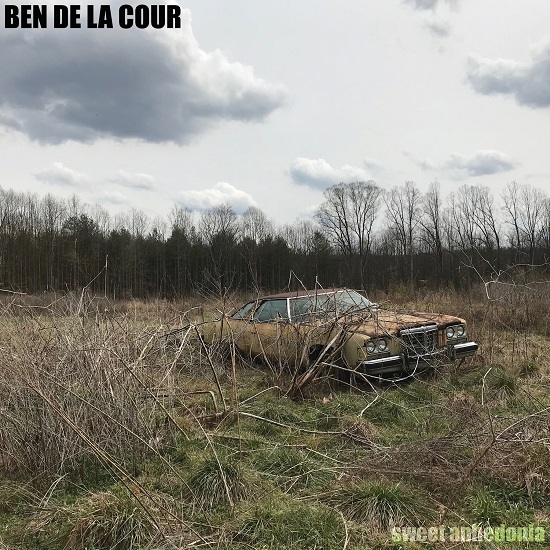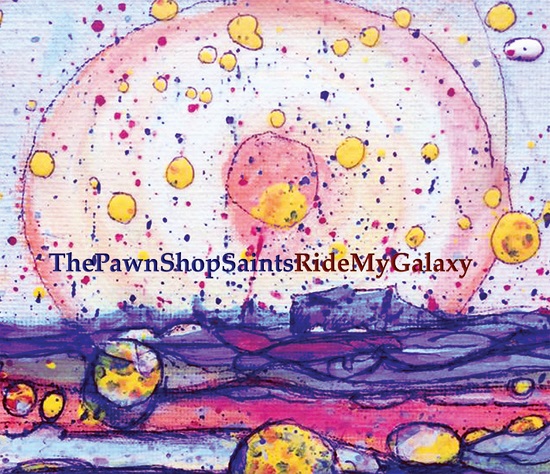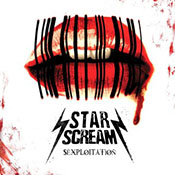
Usually the most difficult thing about reviewing music is working out where to start. Ben de la Cour solves that problem by giving the title song of his new album an enigmatic and intriguing title of ‘Sweet Anhedonia’. I had to look it up, and, logically enough, it comes from the same Ancient Greek root as hedonism and it means the inability to feel pleasure; it’s usually associated with illnesses such as depression. Maybe it’s just a coincidence, but there may be a reference to the 1996 Catatonia single, ‘Sweet Catatonia’. The title song, ‘Sweet Anhedonia’, is a melancholy exploration of this condition with a haunting triple time arrangement enhanced by delicate backing vocals and pedal steel.
There’s a lot more to Ben de la Cour than melancholy. There’s some wordplay in the song titles ‘Appalachian Book of the Dead’ and ‘Suicide of Town’, there are a couple of co-writes with very interesting songwriters, some great stories and some interesting arrangements. One of the co-writes, ‘Numbers Game’, was written with the gifted Canadian singer-songwriter Lynne Hanson and deals with the loading of life’s dice in favour of the privileged, set against a backdrop of finger-picked acoustic guitars, fiddle, pedal steel and Laurel Canyon harmonies.
Don’t run away with the idea that ‘Sweet Anhedonia’ is just a bunch of sad songs. The riff-driven ‘Suicide of Town’ is pure FM drivetime with a vocal that hints at Tom Petty and Rob Thomas and guitars playing off against each other, while ‘Shine on the Highway’ combines two electric guitars with fiddle and trumpet to create a song that would feel at home on a Greg Dulli solo album. And talking of influences, ‘American Mind’ hints at Jackson Browne’s apocalyptic feel from ‘Before the Deluge’, with the addition of Vietnam references and martial drumbeat (which is also a common theme throughout the album) for emphasis.
‘Palookaville’ features a series of characters that would fit in perfectly on any of the first three Springsteen album and uses Buddy Holly as an example of an artist whose legacy is untainted because he wasn’t around long enough to go downhill and either hit the skids or end up playing residencies in Vegas.
‘Sweet Anhedonia’ is a lyrically thought-provoking set of songs set against diverse musical backgrounds and textures, incorporating influences from Americana, folk, rock, pop and a whole lot more, skilfully blended to create a work that is entirely Ben de la Cour.
‘Sweet Anhedonia’ is released in the UK on Jullian Records (JR32CD/LP) on Friday October 13th.
Here’s the video for ‘Shine on the Highway’:

‘Ride My Galaxy’ looks like it will be one of three Pawn Shop Saints/Jeb Barry albums conceived in the pandemic to be released in the near future. The thing that unifies this album and will probably unify the remaining two albums is Jeb Barry’s voice. The songs range from the nostalgic West Coast country/rock of ‘Chevy Nova’ to the unrelenting gloom of ‘Ain’t No Mama Here’, but the cracked emotion of the voice that combines the vulnerability of Jackson Browne with the raw power of Greg Dulli is a constant.
There are the trademark Pawn Shop Saints acoustic staples aplenty on the album, but there are also a few elements of pop and rock pushing through the mix. There’s an opening studio chat on ‘Exits’ about getting the song down “mistakes and all” that sets the tone for the album. It’s much more about capturing the feel of the songs, rather than perfect performances. There’s no shortage of nods in the direction of iconic pop and rock figures and songs either. The I-VI chords at the start of ‘diane’ have a hint of Sam Cooke’s ‘Cupid’, while ‘Jenny Why’ has a hint of Danny Whitten’s ‘I Don’t Want to Talk About It’ and an arrangement that’s reminiscent of The Band. The paranoid menace of ‘Wicked’ is emphasised by a band sound that could be Crazy Horse at its most rough and ready. You get the picture; you can pick out the influences, while it’s all held together by great songwriting and Jeb Barry’s voice.
The album opens with a song that isn’t in typical Pawn Shop Saints territory; ‘Chevy Nova’ is unashamed seventies nostalgia. It’s a cars, girls, booze and drugs song, but in an innocent and naïve way. The closing song is firmly back in Pawn Shop Saints lyrical territory with a story of the pain caused by a broken relationship, but with a grungier sound that’s emphasised by a completely live studio recording.
‘Ride My Galaxy’ is an intriguing blend of the hard-edged dirt-poor Americana typified by the floods, crop failures and fever deaths of ’Ain’t No Mama Here’ and some new elements pop, punk, psychedelia and even nostalgia. It’s a good mix and creates a fascinating album.
‘Ride My Galaxy’ is out now Dollyrocker Records (DR20221). Here’s the video for ‘Exits’:

It’s been a long time coming; after over twenty years of making music, Afton Wolfe has finally released a solo album. It’s worth waiting for. “Kings for Sale” is an album created by an artist with an intimate knowledge of the underside of the music business; its compromises, its failures and its occasional successes. This is an album of flawless songs (originals and interpretations) delivered in a rasping baritone over a wide variety of musical settings. The scope of the arrangements, the raw vocal and the subjects of the songs make the Tom Waits comparisons inevitable, but you can hear many other influences there, including a nod towards Greg Dulli’s solo soundscapes on “Cemetery Blues”.
There’s a lot happening instrumentally on “Kings for Sale”, although it’s more about atmosphere and ambience rather than a constant presence from the start to the finish of a song. Afton also uses speech samples and sound effects to create the perfect sonic settings, whether it’s spoken word intros or water flowing through a song. Everything’s there for a reason and nothing’s wasted. And this is probably the moment to get this out of the way; the unusual soundscapes and subject matter, and the rough-hewn baritone voice have more than a hint of Tom Waits. There, I’ve said it.
The album swings into action with a full band and horns on “Paper Piano”, a story of growing up poor and using imagination and creativity to deal with the poverty. It’s a great groove to catch the attention from the letter A and even has a Van Morrison-esque piano breakdown before the big finale. At the other end of the album is a song at the other end of the scale. “O’ Magnolia” is delivered in the style of a hymn by a church choir and is an exhortation to the state of Mississippi to change its flag to remove the old Confederate imagery and replace it with something more representative of the 21st century, namely the state flower, the magnolia*.
Between the opener and the closer, there’s a treasure trove of musical styles and lyrical themes from the slow country fiddle and pedal steel of “Carpenter”, using biblical imagery to tell a story of misunderstandings in crowded, alcohol-soaked rooms to the doom-laden grunge of B.W. Goodwin Jr’s “Cemetery Blues”. The lyrics are minimal, but the sonic treatment creates an atmosphere of menace and foreboding; it’s difficult and beautiful. A personal favourite, following on from “Cemetery Blues” is M.J. West’s “Mrs Ernst’s Piano”, a story of the tentative first steps on a journey to racial equality that’s still far from complete.
Nine songs and nothing resembling a damp squib; Afton Wolfe’s own songs and the carefully chosen interpretations combine to create a lovely blend of styles and lyrical themes. And there are a few thought-provoking references. The word ’cover’ appears twice, a reference to the compromises a musical innovator has to make to survive financially, while the opening line of the album, ‘Every good boy does a little bit better’ references the mnemonic used by educators to teach the notes on the treble stave. That’s the level of detail that you can pick out from these songs.
“Kings for Sale” is out now on Grandiflora Records. Here’s the video for “Dirty Girl”, a road trip down through Mississippi to New Orleans:
*The new Mississippi flag was officially adopted on January 11, and it looks like this:

 Ok, I admit it, we’re a bit late out of the blocks with this one and the reason we’re finally reviewing “Sexploitation” is that Anna-Christina from Lilygun pointed me in the direction of Star Scream; good spot A-C, as ever. Songwriter Adam Lightspeed fronts the band mixing guitar and keyboards with lead vocals and the trio is completed by Natalie Cherry (bass and backing vocals) and Sky London (drums and percussion). With that particular line-up, you probably won’t be too surprised if I tell you that Muse is acknowledged as a major influence. The album is dotted with references to a wide variety of styles and eras, stitched together with such skill, style and unpredictability that the end result is a unique collage.
Ok, I admit it, we’re a bit late out of the blocks with this one and the reason we’re finally reviewing “Sexploitation” is that Anna-Christina from Lilygun pointed me in the direction of Star Scream; good spot A-C, as ever. Songwriter Adam Lightspeed fronts the band mixing guitar and keyboards with lead vocals and the trio is completed by Natalie Cherry (bass and backing vocals) and Sky London (drums and percussion). With that particular line-up, you probably won’t be too surprised if I tell you that Muse is acknowledged as a major influence. The album is dotted with references to a wide variety of styles and eras, stitched together with such skill, style and unpredictability that the end result is a unique collage.
The album opens with the camp theatricality of “Roseblood (Weeping Willow)”, a seedy, sordid tale of exploitation in the skin trade and an arrangement which echoes the Sensational Alex Harvey Band from the early 70s. “Die on the Floor” is another reference to the 70s, fusing a Marc Bolan vocal style with a Sweet stomp and maybe even a bit of early Giorgio Moroder to set the scene for the rest of the album.
When the playing and the dynamics are this good, it’s easy to focus on the music at the expense of the lyrics; if you do, you’re only getting half the picture. Adam is obviously a writer who likes a bit of wordplay and it comes through in some of the titles: the riff-monster “Harlot’s Web”, “Frightmare” and the stomper, “Kill me Kate”. And it doesn’t stop at that; there are some clever turns of phrase in the lyrics as well; how about ‘knight in shining Armani’ from “Frightmare”, and my favourite portmanteau word for the week ‘conspiranoia’, from the hard-riffing glam satire of the current music scene, “Death Shower Scene”. I suspect they ordered in extra kitchen sinks for that one.
Towards the end of the album there are three songs linked by the theme of transgressive or dysfunctional relationships. The trio starts with “Kill me Kate”, progresses through “As the Earth Dies Screaming” with its very effective use of loud-soft dynamics to “Heart of Ice (Falling Out of Love)” which builds by adding instrumental layers for each verse. For once Adam’s voice isn’t on the ragged edge throughout and in the opening verses there’s a hint of Stephen Duffy’s voice (remember him?).
The album’s third and fourth songs also share a theme both poking fun at the faces, the alpha males and females at the forefront of any scene. “Break the Night” is probably the album’s most heavily Muse–influenced song, particularly the vocals and the guitar solo, while “Scenester” pulls influences from everywhere. The song opens like the Clash version of “Brand New Cadillac”, has a breakdown with manic left to right percussion panning, a second breakdown for live audience participation and a guitar solo which would fit perfectly on a Joe Meek record and a crash ending. What more could you want?
The more reflective moments are all towards the end of the album, starting with “When Crimson Lips Spell Murder” which makes good use of dynamics before ending with a delicate string quartet coda. The final big production number, “Obsession”, is built around a sequenced synth riff which loops almost throughout the song, while a piano hook on top adds to the over-the-top Muse feel of the song. The album closes with the stripped-back “The Girl Who Was Death” (just acoustic guitar, strings and some lovely harmonies) and a lead vocal which sounds a lot like Greg Dulli.
“Sexploitation” is an album that grips you because you just don’t know what’s coming next; imagine throwing a lit match into a box of fireworks and you’re about halfway there. The influences are all very transparent but they’re woven so subtly into the rich and contrasting fabric of the songs that they seem to belong there. But it isn’t just about big guitars and thunderous drums; the band use dynamics really effectively and the lyrics are actually worth listening to. In a world of manufactured pop pap and over-hyped ‘next big thing’ acts (did someone mention Royal Blood) this album is a reminder that the real talent is still out there.
Available now from Amazon, iTunes or the band’s website.


